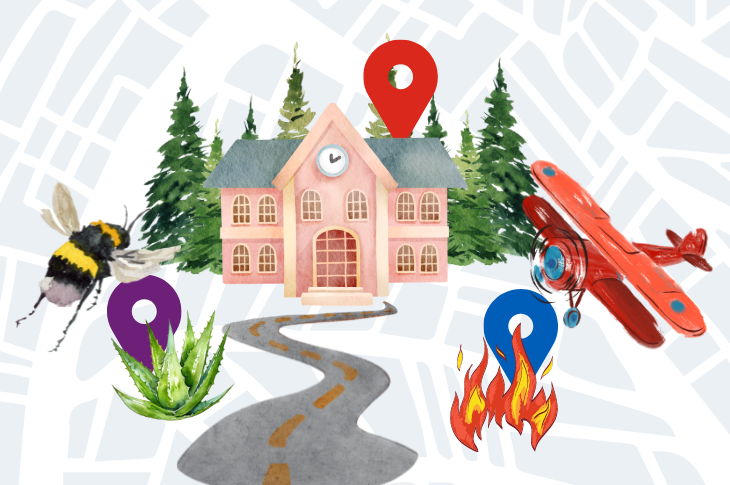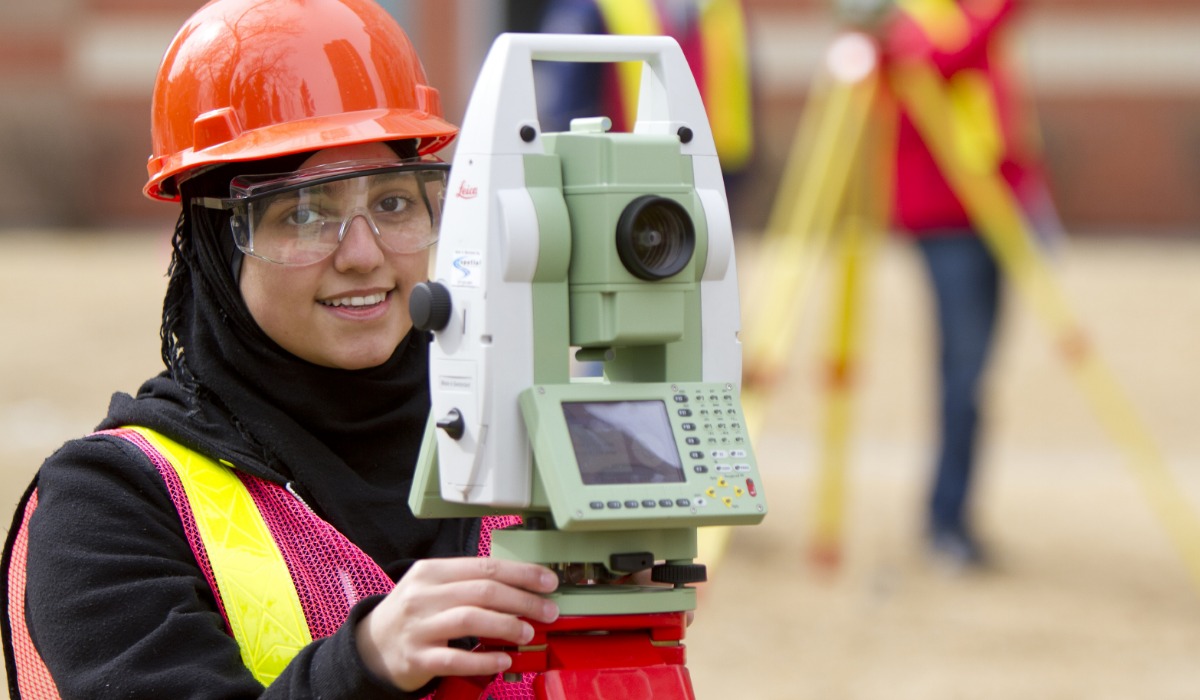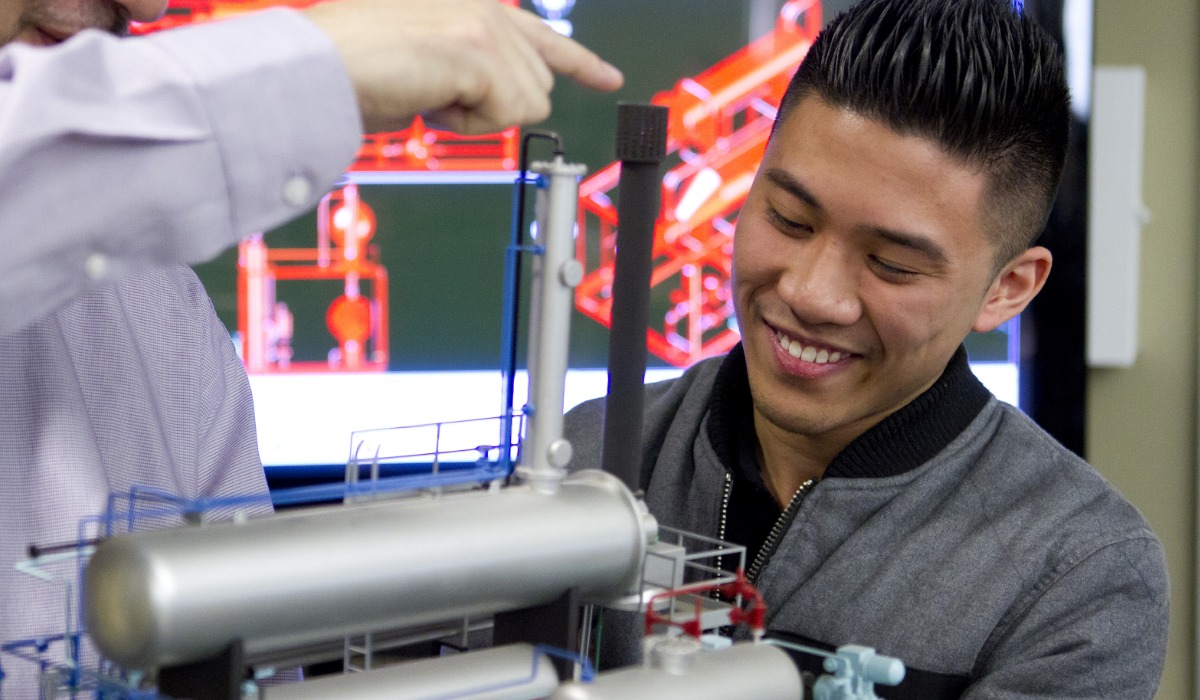Mandatory requirements
Applicants for this program are required to have previously completed post-secondary studies at an accredited post-secondary institution. Review admission requirements for more details.
Overview
The dynamic and practical Bachelor of Applied Technology Geographic Information Systems degree will equip you with specialized knowledge and hands-on experience in Geographic Information Systems (GIS), a rapidly expanding area of information technology.
This program focuses on collecting, analyzing, and interpreting data related to the Earth's surface. As a student, you will delve into spatial data and learn how to use GIS tools to create detailed maps, analyze geographic patterns, and contribute to fields such as urban planning, environmental management, resource management, and emergency services.
To thrive in the program, you should have a previous post-secondary credential, be comfortable with computers, be familiar with file management, and be proficient in standard office applications like word processors and spreadsheets.
In your first year, you will engage with two 15-week semesters of foundational coursework, covering topics from GIS basics to advanced data analysis. You will gain proficiency in working with relational database management systems, cartographic principles, and various GIS software applications.
Alongside technical skills, the curriculum emphasizes critical thinking and problem-solving strategies, ensuring you can confidently approach complex spatial challenges.
The second year of this applied science program offers a distinctive opportunity to apply your classroom knowledge through a work-integrated learning experience (practicum). This hands-on component is designed to immerse you in the industry, allowing you to work on real-world projects, expand your professional network, and enhance your employment prospects post-graduation.
You'll spend approximately 25 hours per week in class and an additional 25 hours on assignments, studying and project work.
The program also offers an online delivery option for those needing flexibility, permitting part-time study. You can balance your education with personal and professional commitments by taking a few courses per semester.
The Bachelor of Applied Technology Geographic Information Systems program will provide you with a strong technical foundation and develop your capacity to make informed decisions that may impact local communities and even global environments.

From bees to trees: 3 student projects show that GIS is everywhere
Student capstone projects explored applications for geographic information systems
Those working in the geographic information systems field tend to be innovative, objective and directive.
You need:
- math skills
- the ability to think logically and critically
- the ability to study spatial problems and measurements
- problem-solving skills
- speaking and listening skills
- people skills
- self-discipline
- to continually learn to stay up to date in industry practices
- the ability to work as part of a multidisciplinary team.
You should enjoy being innovative, being precise, making decisions, supervising others, and having variety in your work.
You'll participate in a capstone project and an 800-hour work experience practicum.
During the capstone project, you will solve a typical business challenge in a cost-effective and timely manner using a GIS-based solution.
During the practicum, you will apply what you've learned in a real-world work environment at a GIS company or in a GIS-related position.
Upon successful completion of this program, you'll receive a SAIT Bachelor of Applied Technology Geographic Information Systems degree.
Careers and opportunities
Each year, SAIT conducts a survey between February and April to determine the employment rate, salary and satisfaction of our newest SAIT alumni.
![]() 90% graduate employment rate
90% graduate employment rate
![]() $65,000 average starting salary
$65,000 average starting salary
Find out more about our graduate employment statistics >
Our graduates may work in the following occupations. Some careers require additional experience and education.
Associated National Occupational Classification (NOC) codes: 22214, 21211, 41409, 21202.
Career planning support
Unsure which career path is for you? Here are some recommended career planning resources to help you decide your future.
You can also head to Alberta alis for lots of information about careers in Alberta, including quizzes and labour market information to help you narrow down a path.
Finally, you can take our online career finder quiz, which can help narrow your options based on your current skills and interests.
Courses
The Bachelor of Applied Technology Geographic Information Systems Business Administration requires 60 credits (12 courses) to complete.
| Course | Credits |
|---|---|
|
This course promotes the development of professional communication skills that complement earlier communication courses and workplace experience. These include interpersonal communication, critical thinking, team management, communicating technical material to a business audience, ethics and professionalism in the workplace. |
1.5 |
|
This course introduces the learner to the foundation, history, development and application of GIS project management theory. Topics include: the GIS cycle, GIS project management concepts, proposal writing, project planning and management as well as methods for controlling and closing out projects. |
1.5 |
|
GIS Data Capture I introduces the learner to the considerations and processes involved in the data capture stage of the geographic information system (GIS) development cycle. Topics include basic geospatial concepts, geospatial data models, and data acquisition techniques such as digitizing, global positioning system (GPS), remote sensing, and geocoding. |
3 |
|
Managing core data is critical to the accurate integration, management, analysis and output of data in a GIS work environment. This course focuses on the fundamentals of managing and manipulating core data and how to troubleshoot problems. Topics include data security, data backup and archival procedures, metadata, data transformations, conversions and translations, survey and mapping systems as well as data generalization and filtering techniques. |
3 |
|
GIS Data Modelling introduces the learner to the fundamentals of data modelling through the design, construction and management of relational databases and geodatabases. Topics include database components and fundamentals, relational database design and creation, querying techniques, tabular data analysis, optimization and geodatabase modelling. |
3 |
|
This course introduces the learner to spatial analysis and cartographic representation with a focus on processes and techniques used during the data analysis and data output stages of the GIS development cycle. Topics include map design principles, symbolization, data classification, map scale and generalization, typography, colour theory and analytical processes such as spatial queries, spatial joins and map overlays. |
3 |
|
Enterprise and Web GIS introduces the student to enterprise and web-based geographic information system (GIS) environments. The focus is on the management of enterprise and web systems, such as ArcGIS Enterprise and ArcGIS Online, to optimize the capture, storage, management, analysis and output of spatial and non-spatial data. The knowledge of these systems will enhance the organizational decision making process. Pre-requisites:
|
3 |
|
This course focuses on raster analysis and the role of remote sensing systems in GIS data capture. Learners will gain a deeper understanding of a geographic information system (GIS) by articulating how this relationship works. Topics include grid statistics, passive and active remote sensing systems such as photographic and multispectral systems, as well as image processing techniques, remotely piloted aircraft systems, LiDAR and GIS integration of these technologies. Pre-requisites:
|
3 |
|
GIS programming introduces the student to high level programming (HLP) language scripting (e.g. Python scripting) for geographic information system (e.g.ArcGIS). Topics include introducing the student to basic HLP language (e.g.Python scripting) fundamentals to advanced geoprocessing using a number of GIS software site packages (e.g.ArcGIS and Arcpy Mapping module) as well as exploring and analyzing spatial data using HLP language and raster datasets using the Spatial Analyst module. The course also covers error handling and debugging and the creation of custom tools using HLP language (e.g. Python) scripting. Pre-requisites:
|
3 |
|
This course introduces the learner to thematic mapping, geographic visualization methods and geospatial analysis techniques commonly used by geographic information system (GIS) professionals to present geographic information. Topics include theories on presenting spatial information, design methodology and cartographic techniques such as bivariate, choropleth and dot mapping techniques as well as the creation of cartograms and map animations for the web. Pre-requisites:
|
3 |
|
During this course, the learners identify a typical business challenge that can be satisfied in a cost effective and timely manner using a GIS-based solution. Learners research, plan, build, implement, test, and present the GIS solution. Topics include project selection, developing a project plan, data capture and management, data analysis, data output and project closure. Pre-requisites:
|
3 |
|
This course allows the learner to apply their technical and soft skills to real-life situations in a real-world work environment through employment in a GIS company or in a GIS-related position. Topics include goal setting, communication skills, problem solving, professional development and networking as well as resume/portfolio writing and presentation. Pre-requisites:
|
30 |
Progression
You must attain a PGPA and/or a CGPA of 2.0 or better each semester and pass the prerequisite courses to progress through the program.
To qualify for graduation, you must pass all courses, attain a CGPA of 2.0 or better and complete course requirements within the prescribed timelines.
Review our grading and progression procedure >
Explore your options!
Some courses in this program are available through Open Studies. You can complete courses via Open Studies to get a head start on your education, reduce your course load once accepted into a credentialed program, or determine which career path best suits you before you fully commit.
You may also take courses for general interest or personal and professional development.
Admission requirements
Applicants educated in Canada
Applicants must demonstrate English language proficiency and meet one of the following requirements or equivalents:
- a two-year diploma from a recognized Canadian college, technical institute or equivalent, or
- successful completion of two years at a recognized post-secondary academic institution.
All applicants who were educated outside of Canada must demonstrate English language proficiency and provide proof they meet the program admission requirements outlined above with an international document assessment. Find accepted educational documents and assessment options.
SAIT may also accept courses completed at certain international post-secondary institutions.
Academic Upgrading
Missing an admission requirement for this program? Upgrade your prior education to help you receive admission into one of SAIT's career programs.
English language proficiency
All applicants must demonstrate English language proficiency prior to admission, including students educated in Canada.
Transfer agreements
At SAIT, we have created transfer agreements with partner institutions to allow you to earn course credits toward your SAIT program based on your previously completed credentials.
Transfer Alberta search tool
Use the Transfer Alberta search tool to see all transfer agreements between Alberta post-secondary institutions (including those with the University of Calgary, Mount Royal University and Bow Valley College.)
Search transfer agreements in Alberta
Transfer options for graduates
When you have completed this program, you may continue your education at a partner post-secondary institution. These transfer agreements include partnerships within and/or outside of Canada.
Available intakes
Fall 2026
Start dates:
- Domestic students: Open
-
-
Application deadline: June 30, 2026
-
- International students: Open
-
-
Application deadline: May 29, 2026
-
Winter 2027
Start dates:
- Domestic Students (apps open March 4, 2026): Closed
-
-
Application deadline: Oct. 23, 2026
-
- International students: Open
-
-
Application deadline: Oct. 9, 2026
-
Costs
2025/26 tuition and fees
The following estimated costs are effective as of July 1, 2025.
The estimated total cost of tuition and fees is based on the suggested schedule of study. Following a modified schedule will impact the fees you pay per semester and may alter final costs.
The second year of this program is dedicated to a practicum placement where you will earn 30.0 credits towards your degree. Only billable hours amounting to 5.7 credits are used to calculate the tuition rate for this year.
Domestic students
The program total is based on the estimated amount you will pay if you enter this program during the 2025/26 academic year. The program total amount listed on your letter of admission may appear higher. This amount is your maximum tuition guarantee for the program. SAIT will not exceed this maximum, regardless of changes in tuition and fees between academic years.
Books and supplies are approximately $500 per full-time year.
This is a bring-your-own-device program with a workstation hardware and software requirement. See the specific requirements on our computers and laptops page.
Find your booklist on the SAIT Bookstore's website. The booklist will be available closer to the program start date.
Can't find your program or course? The bookstore didn't receive a textbook list. Contact your program directly to determine if they're still refining course details or if you're in luck; no textbook purchase is required this term.
Financial aid
Paying for your education may feel overwhelming, but we have resources and programs that can help, including information about payment options, student loans, grants and scholarships.
Application process
Ready to apply?
Follow our step-by-step guide to submitting a successful application.
Communication during admission
Email is the primary source of communication during the selection process. Ensure your personal email account is managed appropriately to receive our emails, files and communications. We recommend you add the construction.advising@sait.ca domain to your safe senders' list or you risk missing critical email messages.
Begin your application
Apply now using the online application portal.
Ensure you have a valid Visa or Mastercard to pay the non-refundable application fee of $120 for domestic applicants or $175 for international applicants.
Information sessions
Prepare for a strong start in your chosen program or get the details you need to decide your future path.
Our expert staff and faculty are ready to answer your questions and provide information about the following:
- What sets SAIT apart
- An introduction to the program and area of study
- Admission requirements
- Future career paths
- Information on the earning potential and graduate employment rates.
Contact us
Prepare for a strong start and get the details you need to make a decision about your future. Our expert staff and faculty are ready to answer your questions, and provide information about:
School of Construction
-
Phone - 403.284.8367
International Student Advising
-
Phone - 403.284.8852
-
Email - international@sait.ca
Subscribe for updates
Your journey starts here! Sign up to get important updates on:
- Business and leadership programs
- Application information
- Relevant news and events

Oki, Âba wathtech, Danit'ada, Tawnshi, Hello.
SAIT is located on the traditional territories of the Niitsitapi (Blackfoot) and the people of Treaty 7 which includes the Siksika, the Piikani, the Kainai, the Tsuut’ina and the Îyârhe Nakoda of Bearspaw, Chiniki and Goodstoney.
We are situated in an area the Blackfoot tribes traditionally called Moh’kinsstis, where the Bow River meets the Elbow River. We now call it the city of Calgary, which is also home to the Métis Nation of Alberta.




